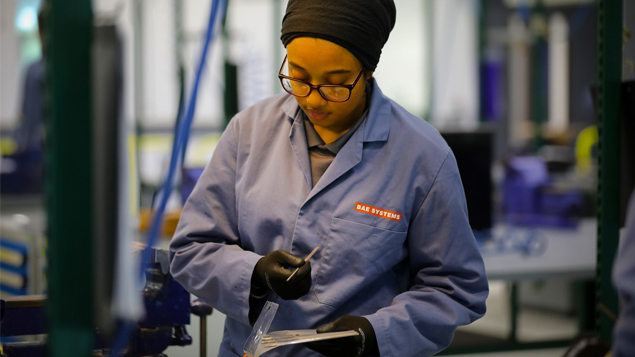[ad_1]

An apprentice at BAE Systems’ Samlesbury air facility Image: BAE Systems
Although most organisations have frozen recruitment while they focus on recovery, BAE Systems is bucking the trend by going ahead with its 2020 apprenticeship intake, as Ashleigh Webber reports.
Most HR teams’ time is likely to be dominated by reintegrating furloughed employees and making tough decisions about redundancies over the next few months. This will unfortunately mean that skills development and hiring will likely be taking a back seat.
However, despite the impact that Covid-19 has had on its operations, BAE Systems is continuing with plans to bring on board 800 apprentices over the next 12 months, in recognition of how crucial they are to the delivery of its projects now and in the future.
“I wrote to our HR directors in April at the point where we had to suspend our interviews – we were due to do 2,100 in April – and I had to get them to confirm they were going to go ahead with [the apprenticeships] because we do need these roles,” Richard Hamer, education director at BAE Systems, tells Personnel Today.
“We’ve got a strong order book, work needs to be done and new employees need to be trained to be competent in technology that is changing… Young people are good at that and it connects with our strategic workforce planning.
“Like many other employers we also have an ageing workforce so we need to replace talent that we know we need as a business… and because we want to bring in fresh people with new creativity and also to create greater diversity within the organisation.”
When applications opened in February, more than 9,000 people applied for the 800 apprenticeships in roles including nuclear engineering, and cyber security.
They could find themselves working on some of the organisation’s most exciting projects, many for the Ministry of Defence, including developing future combat air technologies for the Tempest programme in Warton, Lancashire; the design and build of Dreadnought submarines in Barrow-in-Furness, Cumbria; and Type 26 frigate ships in Glasgow.
BAE Systems offers apprenticeships from level 2 right up to higher and degree-level programmes. Some 35% of its placements are at higher or degree level, 60% are at level 3 and 5% are at level 2. It runs 25 different programmes across air, maritime, land and cyber divisions.
Going digital
With such a critical need for apprentices, BAE Systems could not let the lockdown hamper its recruitment and needed to adjust its practices to ensure candidates could still be assessed. Video interviews were held using HireVue, which will shortly be followed up with confirmatory telephone calls for successful applicants.
Using video interviews may have been more successful than physical face-to-face meeting, suggests Hamer: “Our younger apprentices are used to using digital tools and social media in their home lives, so in some ways they’re more comfortable doing that than they would be talking to me. It’s an environment they’re used to.”
With Covid-Secure restrictions likely to remain in place for some months to come, the apprenticeship intake will be staggered across the next 12 months to ensure social distancing can be adhered to. This will mean training will have to be delivered differently, with greater use of virtual learning and smaller classroom sizes for on-the-job training.
Twenty apprentices will arrive in September, followed by 380 in January. The rest of the intake will arrive in January and May.
“The reason why we’ve done that is to help mitigate the impact of such a large number coming, and also so we can prepare for them properly. Hopefully by October the working environment and restrictions would be easier to manage,” says Hamer.
Induction processes will also need to be overhauled. In previous years, apprentices that have arrived in September have taken part in a week-long induction programme including safety training and social activities, followed by a team-building week away in October. This year inductions will take place online and the programme is likely to be much shorter.
We’ve got a strong order book, work needs to be done and new employees need to be trained to be competent in technology that is changing,” – Richard Hamer, BAE Systems
“A working group will this week look at what the induction groups will look like when they arrive. The one in September will be quite experimental, but in October we’ll have a proper plan in place,” says Hamer.
Some of BAE System’s degree apprentices on submarine projects, who would normally begin their placements in September, are arriving in January because it is likely to take longer for them to receive the full security clearance needed for their roles. This will mean they will need to complete their academic off-the-job studies before beginning their practical work.
The organisation also hopes to bring back existing first- and final-year apprentices shortly. Many have been completing their training from home, where possible, but Hamer recognises that they need more pastoral care at these stages of their programmes than other learners. No apprentices, nor other BAE Systems employees, have been furloughed.
“Our learning providers have been increasing the amount of time learners are given for academic learning support,” says Hamer. “Vocational learning is more difficult, because at this time things like welding are virtually impossible because you have to do it on the job.”
L&D job opportunities on Personnel Today
[ad_2]
Source link





